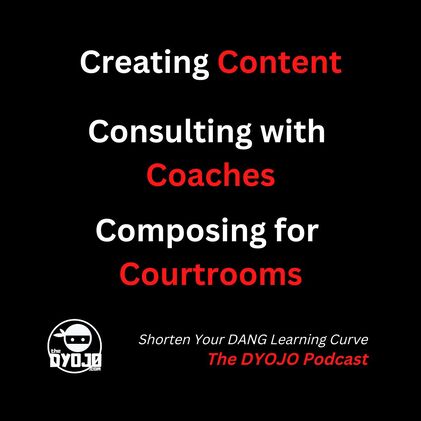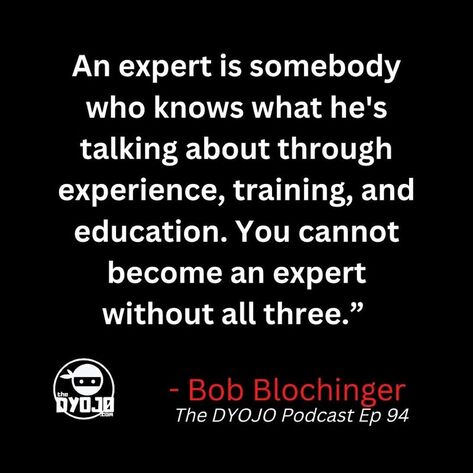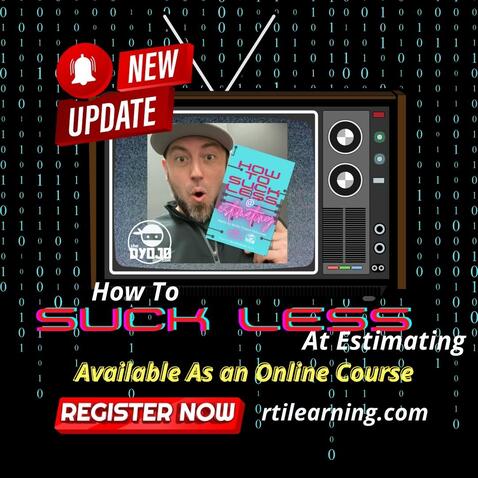|
In our latest video from The DYOJO Podcast we discuss three things:
Overcoming the fear of creating contentIf you have something on your heart that you want to share with your industry peers, we want to encourage you to HIT SEND. I was talking to some industry professionals earlier this week about creating content. There are several of you that I've talked to that have the content either ready to upload articles, books, videos, or podcasts. You're ready to hit send, but for whatever reason, you have not. Too often what we hear about as professionals is the finished product. Whether we are scared to share or have been stymied into silence by success, we should encourage and seek out stories that help us see the process that led to the outcome." What I'd like to relay to you is a little piece of the story that I shared in an article called Creating Impactful Content, which has been published through Property Casualty 360. I shared a personal story about some excellent advice that Rachel Stewart, author of Unqualified Success, gave me. If you have not read her book yet, it's one of the best in the self-help category that I have read. I am happy to report that it's from the property restoration industry. One day, after reading her book, we had a call. If we had not made contact, I my first book may not have happened or would have taken a lot longer to be published. During our conversation, I was sharing that I wanted to write a book but didn't know if I had unique content to share. I am paraphrasing her response, but she said that there is no unique or new content, there's only your unique experiences, approach, and applications of those principles. This simple truth was very freeing to me and it's good advice for anyone who has something they want to share. What is impactful about your story or my story is exactly that, it's our story. When you can share, "These are the issues I faced, these are the creative solutions that our team came up with, and this is how we've seen those ideas either just flame or make a positive impact in our company. I believe this is the key to good, impactful content. Most of the positive feedback that we get from our podcast is that people are encouraged to hear the real-life stories of their peers. It's encouraging to hear someone say that they've been there, they've done that, and lived to tell about it. You can help others shorten their dang learning curve by sharing the lessons that have shortened yours. Working with the right mentorsAll these half assed contractors out there, who are not doing things properly. Who are not following your own SOPs. Who are not creating systems and things in place to protect yourselves. You're only hurting the industry and yourself. Stop it, get smart." - Whitney Wiseman We want to shorten our dang learning curve, but there's no replacing it. We want to thank Whitney Wiseman for joining us for a recent conversation. We are going to share some of his thoughts on working with the right mentors and coaches for your business. Whitney advises, "Reach outside of social media, find individuals who excel in their space, and make sure that you learn as much as you possibly can from these individuals." The way he sees it, too many in the coaching space are looking to make money rather than being a resource and helping the industry. He says, "I see more mentors in our industry right now that want to make money off of everybody who's green, then I do any individuals who are just willing to help. And to me, that's sad, because I came up in this industry where there were people who would answer their phone, give me the advice that I need, and it was free. But right now, it's a weird world." If you are new to the industry, you may have felt the same way. Mr. Wiseman is not saying that there are no good coaches or mentors, rather be wise in how you determine who you are going to work with. "There's a lot of people, though, that can really help you to be the best in the industry. Reach inside the industry for those people." He believes that a lot of good also comes out of looking outside of "the box" or the mindset of a given industry. For example, "When it comes to contracts, when it comes to business, when it comes to all these other things get as far outside of this industries mindset as you can and started attacking it as a professional. For instance, we are a specialized trade in the construction industry. We all should act like contractors and we should be professional in our state, as our state regulates us too. We should utilize everything that is in our power in order to protect ourselves from a customer screwing us over. At no point in time should we use these shortcuts in order to gain success, because I can guarantee every single person that the long road is worth it every single time versus the shortcuts. Learn from my mistakes." Learning from each others mistakes is an excellent way to shorten our dang learning curves. As we said in the segment above on creating content, if you have experiences to share of ideas that worked, and even those that failed, these can be impactful to your peers who are also learning to succeed. Preparing for courtFor episode 94 of The DYOJO Podcast, we asked Bob Blochinger, "If someone were to call themselves an industry expert, what would your expectation be of their like credentials and experience be?"
Bob may have the quote of 2022 when he shares, "An expert is somebody who knows what he's talking about through experience, training, and education. I call it a pyramid of training, education and experience. You cannot become an expert without all three." He calls this a pyramid of expertise. As a flooring expert, Mr. Blochinger is no stranger to the courtroom, he has been called upon as an expert witness multiple times. He states that an expert is expected to answer, "Whatever questions or explore bugs or problems or whatever exists that needs explanation or evaluation." We have heard it said that if you can't explain it to an elementary aged child, you don't really know what you are talking about. In the courtroom, Bob says an expert, "Needs to know what he's saying and how to explain it so a regular person understands. For instance, when you sit in a court in the witness stand and you get grilled by the opposing attorney, you do not have notes in front of you, you do not have a book, you do not have photographs, but you have to ask answer all the questions." If you have developed mastery through experience, training, and education you will come across as intelligent. The Federal Rules of Evidence 702 outlines the Daubert Standard whereby a witness who is qualified as an expert via their knowledge, skill, experience, training, or education. An expert may testify in the form of an opinion or otherwise, if a their scientific, technical or other specialized knowledge help "the trier of fact" to understand the evidence or to determine a fact in issue. The Daubert Standard is also a great metric for determining information that you are receiving as a profession is relevant and reliable. When you receive information from industry leaders, influencers, or experts, you can more effectively ask, "Is this relevant to my situation and does the advice rest on a reliable foundation?" In court the testimony must demonstrate that it is based on sufficient facts or data. The opinion of the expert should have been demonstrated to be the product of reliable principles and methods. This affirms that as professionals we want to apply a scientific method or methodology to the processing of information for determining what advice is reliable. A scientific methodology helps us determine whether the theory or technique employed by an "expert: is:
That last point is interesting as we want to eliminate confirmation bias. Just because we hypothesize something, we then need to guard against our inclination to only present the information that supports our hypothesis. We have to be open to our hypothesis being wrong, or we are not being scientific. As an expert witness the professional must demonstrate that they have reliably applied the principles and methods to the facts of the case. How important is this in our professional journeys? When I am reading industry publications like C&R magazine or Cleanfax, I find myself listening for those people who have been there, done that. Those who have a problem, discussed it with their team and said, "This is a creative solution that has worked for us." Mr. Blochinger closes our discussion with these insights, "You need to know what you're talking about to be labeled as an expert. Commonly people say, 'Well, I'm 50 miles away, so I must be an expert.' It doesn't work that way. You don't become an expert without years of training, experience, and education."
0 Comments
Leave a Reply. |
Words
The DYOJO - helping contractors shorten Archives
June 2024
Categories
All
EstimatingMarketingInsurance ClaimsLeadership |
|
| |||||||




 RSS Feed
RSS Feed
